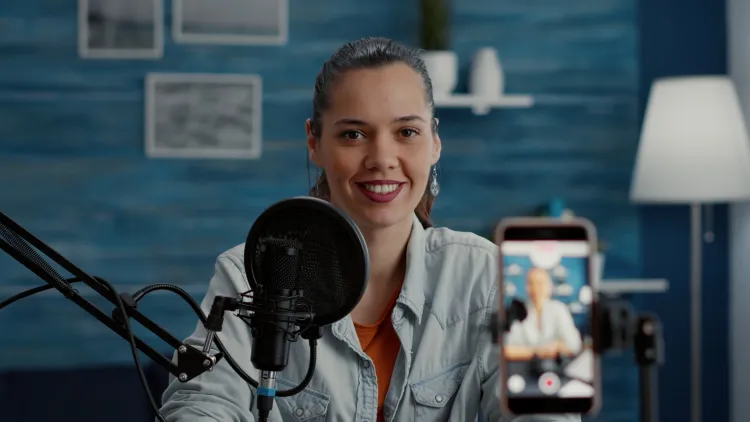If you’re reading this, you’ve either got a branded B2B podcast you want to grow, or you’re thinking about starting one soon.
Whichever bracket you fall into, there are a few things to take into account if you want your show to resonate with the right kinds of listeners (i.e. those likely to eventually become your clients).
Stick with us for a few minutes and we’ll take you through 15 B2B podcast best practices that you can easily apply to your own content strategy.
Let’s get straight into it.
1. Define Your Target Listener From the Start
There’s no point creating, recording, and producing a B2B podcast if you’re not sure who your target listener is. Who do you want it to reach? And who do you actually want to buy your product or service? Getting clear on these points early on means you can adapt your language, tone, and overall strategy to speak to the right people directly. Failing to do this can result in unclear messaging, and you run the risk of producing a show that doesn’t really resonate with anyone.
2. Develop a Podcast Format That Fits Your Audience
Once you’ve defined your target audience, brainstorming what you know about them can be useful when finding the right concept for your B2B podcast. What topics do you think they’ll generally want to hear about, and find valuable? If you can find genuine pain points and pitch helpful solutions on your show, you’re golden. Plus, what sort of format are your audience (& potential clients) likely to engage and interact with most? A younger demographic will have very different preferences to an older one. It’s your job as the podcast host to diagnose this.
3. Research Other B2B Podcasts in Your Niche
It goes without saying there are already a lot of podcasts out there. Carrying out some competitor research on other B2B podcasts in your space will give you an idea of what listeners want to hear, and what has already been covered. You don’t want to simply replicate another brand’s style or concept. Instead, look at what already exists and think how you can add your own unique spin. What angle or perspective can you offer that others can’t? Once you have an idea of what's currently performing well in your niche, you’ll find it much easier to develop a B2B concept that’s relevant, yet different enough to stand out.
4. Invest in High-Quality Equipment & Editing Software
As mentioned previously, there are certainly a lot of podcasts on the market. But an awful lot of them are very poorly produced. They give off a distinctly amateur vibe. The good news is this makes it easier for you to stand out. If you invest in the right equipment and spend the time required to produce high-quality, professional-sounding episodes, you’ll instantly be ahead of much of the competition.
Production quality speaks volumes when it comes to branded B2B content. It does require an upfront investment. But it’s definitely worth it if you’re serious about podcasting. If you need some guidance in regards to which equipment to invest in, check out the guides below:
Top 9 Best Podcast Microphones (Budget & Pro)
The Complete Guide to Recording Podcasts Remotely
5. Plan Your Time & Budget Your Costs
Being realistic in regards to your production budget and available resource is important. And before you even think about drafting your first podcast script, you need to sit down and work out how much time and money your business can dedicate to a podcast. This will give you a clear vision from the get-go, and can help to avoid over-committing and under-delivering. A simple way of doing this is to make a spreadsheet of all initial costs (both financially and in terms of hours spent) and go from there.
6. Tell Listeners Your Brand’s Story
Creating transparency about the origins of your business, and the values you stand for can be really beneficial when it comes to building a dedicated clientele. If clients genuinely feel like they know who you are as a brand, they’ll be more willing to work with you.
Keynote speaker and sales expert John Livesay recently appeared on Park Howell’s (“the world’s most industrious storyteller”) The Business of Story podcast. During the episode, he shared his top 5 storytelling secrets for brands. And one of them was telling your brand’s origin story. He said:
The biggest mistake I see brands making is when they only talk about their product, its features, and how good it is. Great, but what’s your origin story? People want to work with people who are passionate about what they’re doing. Instead of just regurgitating your bio, pull out a story. People want to buy you as much as they do the product, so you need them to like your energy.
Have a listen to Livesay's other 4 storytelling secrets below:
7. Inform Listeners in an Entertaining Way
Fun, entertaining content will always resonate more with listeners than something that’s stiff and boring. Plus they’ll be more inclined to keep coming back for more. Content that makes people laugh or sparks debate is far more likely to be shared on social media too. So if you're recording episodes solo, try to think of ways you could inject life into topics that otherwise may be perceived as dry or "boring".
If you interview experts on your show, be very selective about who you have on. In today’s market, interview-based shows live or die on the quality of their guests. High-quality production value paired with high-caliber talent is the most reliable way to build an audience. The quality of guests featured in your previous episodes are implicitly reflective of the quality of your brand.
Of course, the bigger the guest is, the harder they are to book. But you should maintain strict standards here. Only interview guests that truly reflect the quality and integrity of your brand. You’ll have to spend more time pitching and you’ll probably receive quite a few rejections. But booking great quests is a numbers game. A 5-10% success rate is to be expected, especially if you’re just starting out with your podcast.
Finding and booking guests doesn't have to be overly difficult though, thanks to MatchMaker.fm. Once you've signed up, just set up a show profile. From there, you'll be able to browse thousands of guests and reach out to the ones you think will be a good fit for your podcast.

Book Your Next Podcast Guest the Easy Way
With more than 70,000 members, MatchMaker.fm is the largest online community connecting podcasters & guests.
Join MatchMaker today8. Cross-Promote Content With Other Podcasters
If you’re a smaller business trying to increase awareness of your brand, podcast cross-promotion is good for growth. This involves forming partnerships with other hosts in the B2B space to advertise each other's shows. You let their audience know about your podcast, and they let your audience know about theirs. It creates a win-win situation for both of you (as long as you aren't direct competitors, obviously).
There are two main approaches typically used for cross-promotion: ad-swaps and content collaborations. An ad-swap is when you place a short advertisement for your podcast on another podcast. And vice versa. A content collaboration is typically where you interview another podcaster on your show, and they interview you on theirs. You can quickly find opportunities for ad swaps and content collabs on MatchMaker too.
9. Make Concise Call-To-Actions
Making clear, direct call-to-actions (CTAs) during your episodes is key for generating an ROI. And inevitably, this can play a big part in your brand’s growth. Is there something specific you’d like them to do? It might be following you on social media, signing up to your newsletter, or joining your community. Whatever it is, you want to state it explicitly in your episodes (usually in the intros and outros). Don’t go overboard though. Cramming your podcast full of CTAs will make it sound like one long sales-pitch.
10. Ask Listeners to Leave You a Review
If you can get listeners to leave your podcast a review, you’ll build credibility around your brand a lot quicker. And the more credible your brand appears, the more likely it’ll be that your target listeners will engage. The likelihood of clients actively seeking out reviews before buying from or working with you is highly likely. Good reviews will also help you rank on the podcast charts, so the more reviews you have, the more visible you’ll be.
11. Directly Seek Word-Of-Mouth Referrals
As a podcast host, you should never underestimate the power of word-of-mouth recommendations. What we mean by this, is to simply ask your audience to tell a friend, colleague or family member about your business. Again, don’t pressure your listeners. If you over-do it with multiple pleas per episode, you’ll just annoy them.
Instead, a quick nudge at the end of each episode will suffice. The Knowledge Project with Shane Parrish offers a good example of this. Here’s how he typically closes the last few seconds of each episode:
Can you do me a small favour? Go online right now and share this episode with one friend, who you think will love it.
12. Be Consistent With Your Publishing Schedule
Building a loyal B2B podcast audience doesn’t happen overnight. You need to dedicate a lot of time over months and years to make it a success. And this means you need to be consistent with your publishing schedule. For a newly launched brand with no existing following, to hit 1,000+ downloads per episode you'll likely need to publish every week for at least 12 months. If you’re a brand with a well-established following already, you’ll probably see much quicker growth.
13. Always Repurpose Your Content
Repurposing episodes into other formats is crucial for driving engagement. Sharing a link to your new episode on social media will only get you so far. It requires a bit more effort to earn new listeners. Plus, it’s always good to flesh out your content strategy and get maximum mileage out of every episode you release. To give you an idea, you might want to convert your episodes into some of the formats below:
- Social media images and posts
- Transcripts
- Long-form blog posts
- Audiograms and video teasers
- Downloadable PDFs
Amy Woods (founder of Content10x) recently spoke to us over at Podcast.co regarding some of the effectiveness of content repurposing. She said:
If you can repurpose your audio content to start conversations on social media, you’ll fuel engagement on each platform. And it could actually account for a post a day. It doesn’t take that much extra time or brain effort to do, because you’ve already done the hard work making the episode.
14. Write up Show Notes for Each Episode
Publishing podcast episodes without show notes means you’re missing an opportunity to increase your website traffic and reach new potential listeners. Well-written show notes create an incentive for your existing listeners to visit your site. And they also help strengthen the overall SEO presence of your podcast. In short, they act as a central information hub for your episodes, providing relevant contextual detail, timestamps, links to helpful resources, and more. Show notes also give you the opportunity to cross-promote older episodes, make them more shareable, and encourage people to hit ‘subscribe’.
15. Outsource Your Podcast Production
There’s no denying that producing a podcast takes a lot of work. And that’s why it’s always smart to invest in your show and do it well. For many who are serious about growing their show, this might look like outsourcing certain production tasks to a producer or various freelancers. It can be anything from sound design, to visual assets, to scriptwriting. It’s completely up to you to figure out what you need help with.
If you’re a bigger brand with a production budget to work with, you might decide to partner up with a production agency. An agency will handle everything from the initial concepting stage, right down to promotion and distribution. That’s exactly what we offer over at Cue Podcasts. You can check out our showreel below:
Cue is a full-service production agency that specialises in giving brands a voice - balancing creativity, collaboration, and technical excellence to reach the right audiences.
Implementing B2B Podcast Best Practices
Hopefully, you’ve now got a much clearer idea of what you can be doing to make your branded B2B podcast a high-performing one.
Remember that any podcast takes a lot of time and dedication to start seeing results. So don’t be disheartened if the download figures and sales don’t come flooding in after the very first episode. Stay consistent, focus on quality, and the results will come.
That being said, if you can find a concept that’s unique to your brand, and actually appeals to your target listener, you’re off to a great start.

The #1 Podcasting Community
With more than 70,000 members, MatchMaker.fm is the largest online community connecting podcasters & guests.
Join MatchMaker today





